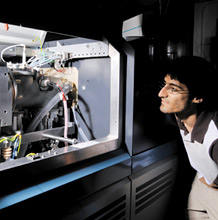Summary
Amazingly, in the right hands a mass spectrometer can:
- reveal how the mix of gases in the atmosphere has changed and how temperature has varied on the surface of the Earth or deep in the ocean over eons;
- uncover the migration patterns in birds; and
- determine the diet of long extinct animals.
And that's just for starters. Scientists use mass spectrometers to elucidate the chemical structures of molecules or chemical compounds and then interpret those results to unravel a wide variety of physical, chemical and biological puzzles.
The two new isotope ratio mass spectrometers purchased with this grant will be located in the University's newly renovated stable isotope geochemistry lab but they will support the work of many departments. Currently, the "newest" IRMS in the lab is 20 years old.
Here's how a mass spectrometer works: The compound to be tested is ionized (transformed into electrically charged particles); the resulting flow of charged molecules or molecule fragments is passed through an electric or magnetic field; the different paths and patterns that the particles take are recorded and analyzed.
"Beyond helping to answer fundamental questions in Earth and environmental science, the University will use the mass spectrometers to train the next generation of talented scientists and technicians," Colman said.
More than 70 graduate students and almost 70 postdoctoral associates will have access to the equipment. In addition, the geochemistry lab will support a mentorship program to train high school teachers from disadvantaged areas of Chicago's South Side. Many of the technical and analytical skills that these students and teachers will hone by utilizing this equipment and interpreting the results will be transferable to other realms of scientific discovery.
"It's difficult to predict what discoveries will be made by the future scientist who will train on our new cutting-edge mass spectrometers," Colman said. "Nevertheless, I have no doubt that many fundamental discoveries will be made in, for example, ecosystem responses to climatic disruptions as well as in the biological cycling of nutrients and carbon in the oceans."
by Greg Borzo
This award is funded under the American Recovery and Reinvestment Act of 2009, NSF Award number: 0923831. For more information on NSF Recovery Act projects, visit http://www.nsf.gov/recovery/.

 Ultrathin but super strong
Ultrathin but super strong
 Addressing Health Disparities
Addressing Health Disparities
 A new way to fight transplant rejection
A new way to fight transplant rejection
 Building a better mouse model
Building a better mouse model
 Testing tools that detect head/neck cancer
Testing tools that detect head/neck cancer
 New equipment opens up the world
New equipment opens up the world
 Tracking climate change by studying solar radiation
Tracking climate change by studying solar radiation

